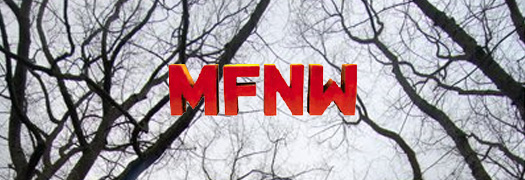
Features | Festivals
Musicfest Northwest 2008
By Dom Sinacola | 16 September 2008
:: Photos by Ron Ulicny
Again: Wee!
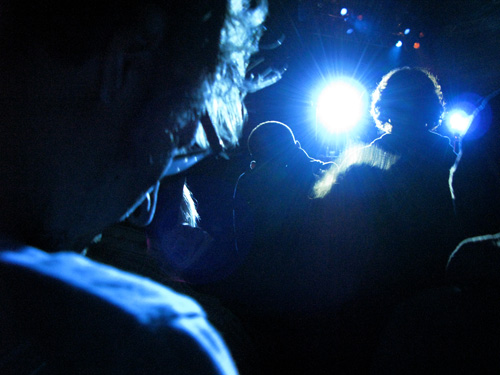
Frightened, the Vampire Weekend fan called his mom for a ride but then berated her in front of all his friends for taking too long.
This time I mean it. Never once begrudgingly coerced into show or venue observation, never truly bound by obligation or pushed by non-existent internal pistons greased solely by the good intentions of a local weekly or some label reps or alcohol, I spent four long days and nights at Musicfest Northwest and enjoyed the fuck out of it. The best part, though, surfaced in a completely unexpected resurgence of faith—nebulous religiosity suturing together my atheism towards summer festivals and my hope that any pablum of praise for the recent cast of popular indie acts could somehow stand tall behind regional importance. Folks, here’s your Festival 2.0.
The story is simple: In 2000, when the North By Northwest festival closed its administrative doors, Willamette Week, a local Portland weekly and one of the forces behind NXNW, seized the opportunity to put together a smattering of shows that would somehow support, showcase, and kiss (on the mouth) Northwest artists and acts. Portland was the locus and under that idea spread care and equitable attention to almost every notable venue in the city. The romance grew, so much so that national artists became headlining acts, even topping last year’s events with the now-ubiquitous Spoon. Of course, 2008 meant regional aberrations like Mogwai, Dan Deacon, TV on the Radio, Les Savy Fav, and the Cool Kids, but, unlike the stalwart clusterfucks of primo names and trends that lost their focus long ago (Pitchfork and Lollapalooza), the most salient attitude of MFNW was and is, clearly I should add, a devotion and love for the region that birthed it.
Which isn’t a novel idea, just a difficult one to pull off on this scale. Corporate sponsors like Nike, Comcast, Myspace, Scion, Virgin, Heineken, and BMI made the rounds and caffeinated festival advertising, but there was never any shame in attending under those banners—the banners that did adorn each venue printed those four fat, red sans-serif letters and little else. (Though the stages were named based on sponsors, the names never had much notice over the individual venues. Plus, the Southern Comfort Stage sounds kinda fun, eh?) The festival booklet falling from the pages of every Willamette Week featured the Helio Sequence at the fore, throwing love to something of a mainstay in the Northwest scene. The Mission Theater premiered a documentary about Seattle punk band the Gits and Beautiful Losers, an investigation of the skateboard, punk, and graffiti artists that helped, trans-continentally, shape some of the Portland alternative scene in the early ‘90s. The venues, in fact, made for an easily traversable core, spaced in halos around downtown but spreading into each of the city’s four quadrants. The effect, in total I mean, was a sense of glittering pride; corporate dollars and international names just pushed that scope even further, widening the reach to communicate one big, bloated, but heart-warming conceit: this area matters.
It’s a shame that I even have to couch my coverage in such prequalification. I once thought that festivals were the easiest and most accessible way to translate specific memes and personalities into an experience, that a zeitgeist, underground or otherwise, could tangibly monetize its efforts and reward its adherents and stand out as a force of its own, a force that can actually draw people into its wake based around ideals about home, local culture, and, God forgive me, roots. I mean, the Pitchfork Festival still does that, selling Pitchfork-ocity by the bundle if you happen to buy into Pitchfork-ness. But somewhere the idea of the festival lost its way, sometime after the first Intonation festival, when in only a few years the most interesting sociological piece of any festival’s success—the region—became an afterthought. Why try to understand and celebrate the community that makes a festival possible when you can create that community and prescribe values? Granted, I’m targeting smaller festivals—the independents, say. And fuck, I’m fine with a series of shows centering around some sort of genre or approach to making music, but regional allegiance, if I can stay broad for a moment, has made for a quickly closing aperture.
In less innovative and careful light, the faces of modern summer festivals are changing; leaving actually: Radiohead, I love you, but you have seemingly single-handedly driven out all discerning personality from 2008’s cadre of heat-stroke gatherings. (You were there at Pitchfork in spirit. I saw your wonky eye staring down at me, staring through me from behind a crack in the VIP fence, Thom.) In less than a year, the pick for the months of May to September has become, for all the actual dates to attend, slim, convenient, and then, after some effort, ostensibly exciting but ultimately faceless. Like the new TV on the Radio record.
Refreshingly, the acts colored the popular notions of the Northwest pop scene that have, saturation or not, begun to define Portland, Seattle, Vancouver, and surrounding areas in the past few years: Menomena (who, not-so-strangely, opened for headlining Helio Sequence at the Crystal Ballroom on Saturday night) absolutely and briefly ruled as the audience shouted hero worship; Blitzen Trapper epitomized the alt-country spread that’s grabbed the region while being ramshackle enough to belie their glut; Lackthereof, replete with a full band and selling 180g vinyl for only ten bucks each, pounded through all of Your Anchor and, in retrospect, made that tiny record sound like a strange, seething ogre; John Vanderslice, who toploaded his set with Cellar Door (2004) cuts, perched, doofus-y and waif-thin, in between all that glistening electro-power-pop that’s fairly limned him thus far. Don’t forget Velella Velella, a fucking riot to witness live, primed for fun if only because they were cramming their shitstorm of dance doohickies onto the stage at Jimmy Mak’s, which is an intimate jazz spot. Conspicuously missing, though, were any hip-hop acts from the area (or much hip-hop for that matter, not counting hipster gold like the Cool Kids and Del) or any mention of the burgeoning club dance scene. Baby steps, maybe.
Being a Midwesterner had its benefits too. Waiting in line to see Les Savy Fav on Saturday night, the Wonder Ballroom already at capacity due to (sigh) Ratatat, hope seemed thin that we’d get in. Then, half the place emptied, skinny-pants’d dirtwads loudly mentioning how they had no idea, nor cared, who “Les Save-ey-fave” was, leaving room for me and my group to enjoy a predictably rabid hour of Tim Harrington. Did he bring a full ladder onto the audience so that he could climb up and be supported solely by the non-existent biceps of the first few rows? Yes; brought to you by Nike. When the Cool Kids played Friday at the Roseland, there was enough room in the balcony to arrive late, sit down, drink beer, dance, and still have a miraculous view. Their set, though short and peppered with more standbys than necessary, still built on one of the few worthwhile results from Lollapalooza: that the two Chicago young’uns should get used to hyperbole.
Then there was Fuck Buttons. Then there was Mogwai. Ear canals shuddered and our gossamer-thin eardrums disintegrated. Fuck Buttons were probably the coolest surprise of the weekend, utterly transformed from the dullness of the Pitchfork experience to be animated, gleeful, and sloppy. Mogwai, stentorian and patient as ever, relied little on their new material, instead making the lo-end the star of the show and built swirling paeans to post-anything around the festival’s most notorious live show. Shit grooved—check it out:
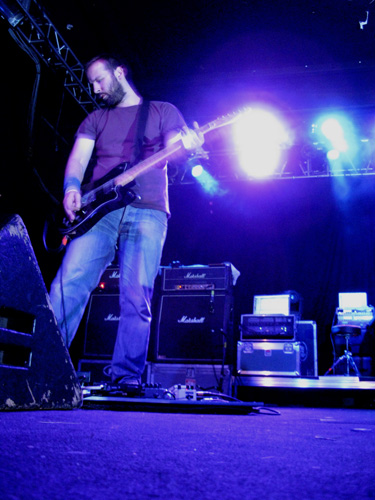
Wow! That’s loud!
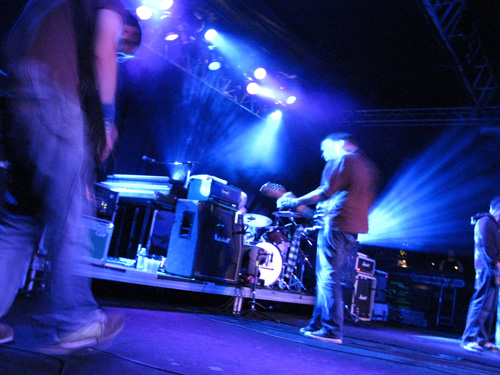
Is this loud or is it just me?
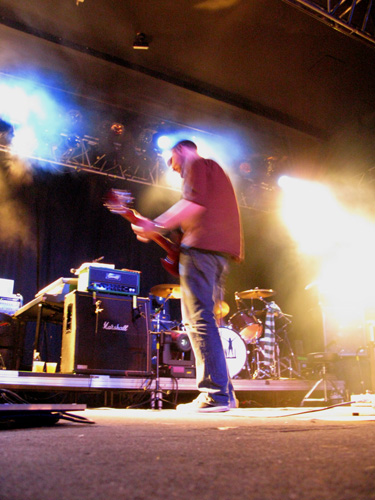
It’s not just me! This is loud!
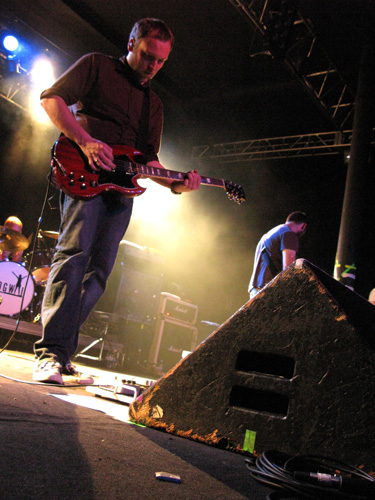
This part wasn’t that loud.
Inevitably, Vampire Weekend had to find their way to MFNW. I didn’t stay to watch them, even though I don’t necessarily mind their bland, cocksure, ignorant designer douchepaper (that’s wallpaper, only made of douches). I did leave because Vampire Weekend fans are assholes. No, they are. No, really. They call the band “Vampire” and talk incessantly through the opening acts with voices that preternaturally pierce through any surrounding din. They make the very act of watching live music a chore. They don’t give a fuck about an oxford comma because they don’t know what it is and don’t want to look it up. As we walked down the long steps to the lobby of the Crystal Ballroom I fantasized about that nauseatingly bouncy venue floor collapsing and killing them all, their flesh torn up by splintering floorbeams, their tight clothes causing infection in the wounds. I smiled.
But anyways. Simple pleasures, really. It’s hard not to shelter some ecstasy for a festival that simply succeeded, that simply represented its region under that same, simple goal, that made getting from venue to venue simple, made parking and bike commuting simultaneously simple, made distracting and winding tendons of influence and artistic proliferation so simply digestible. I won’t claim to understand the region in so short a time; instead, I’ll admire it for now. I’ll appreciate it. And, in time, I’ll look for any other festival that treats its ground with respect and its people like they have something to say outside the dunderheaded blob of hype and –ocity that threatens to make the simplest of communal ideas in modern music some faux pas under the looming shadow of e-growth.





